
I don't know about you but I hate waste!
I always make sure to eat leftovers.
The problem is that you shouldn't do anything with leftover food!
At the risk of indigestion, even food poisoning...
This is true for both leftovers at home and leftovers brought back from a restaurant.
Luckily, here's the essential guide to knowing how long leftovers keep . Watch:

- Wash your hands before and after touching leftover meals. To keep your hands clean, just wash them with hot water and soap. Don't forget to wash the kitchen utensils and the worktop carefully afterwards.
- Food scraps should never stay very long at a temperature between 4°C and 60°C. Why ? Because at these temperatures, bacteria dangerous to health can develop.
- If a cooked food has remained more than 2 hours at room temperature, it must be thrown away.
- Don't rely on your sense of smell, sight or taste to know if a food is still good or not. It is a mistake. Even if your senses are highly developed, they cannot detect contaminated food.
- If you have the slightest doubt, throw away the leftovers. It is better to waste a little than to get sick.
- The best way to cool leftovers is to immediately place them in the fridge in an open, shallow container. The fact that the latter is shallow will speed up the cooling of the dish.
- If the leftovers are still hot, let them cool in the open air. When they no longer give off steam, put them in the fridge.
- While waiting for the leftovers to cool, put a lid on them or wrap them loosely.
- Avoid overfilling your fridge, otherwise the cold air will not circulate properly and the food will not keep as well.
- Leftovers should be stored in clean containers. Alternatively, you can also use storage bags. Do not mix leftovers:it is best to keep them separate from each other. These precautions help prevent cross-contamination of food.
- You must eat leftovers within 2 or 3 days. If that's not possible, freeze them to eat later (provided they weren't frozen the first time). Click here to discover the freezing rules.
- If you don't freeze your leftovers, mark the containers with the date you put them in the fridge. This way you are sure not to store them too long.
- To defrost food, it is best to place it in the fridge. If you're in a hurry, use your microwave.
- Once the food is defrosted, cook it quickly, if it has not already been done. If the leftovers are already cooked, eat them too right away.
- If you leave your food to thaw in the fridge, place it on a plate or dish on the bottom shelf of the fridge. This will prevent water from defrosting from dripping onto other foods.
- If you use the microwave to defrost leftovers, remember to remove any packaging or containers that are not microwave safe. This is the case with plastic packaging, boxes in which meals are frozen, polystyrene trays... If you are not sure, discover our guide here.
- Consider eating leftovers immediately after defrosting. No question of leaving them lying around for a few hours! Never refreeze a thawed meal, whether you thawed it in the microwave or not.
- Is your dish thawed? All that remains is to eat it after reheating it! You must warm it up until its temperature reaches 74°C.
- You can use a kitchen thermometer to be sure.
- Sauces, soups and gravy should be reheated over high heat to make broths. During this time, never stop stirring.
- Halfway through cooking, turn off the microwave to be able to stir the leftovers. This way, the heat will be evenly distributed throughout the dish. Not only will the outside be warm, but the inside too.
Prepared foods:meats, stews, eggs, cooked vegetables
In the refrigerator at 4°C: 3 or 4 days
In the freezer at -18°C: 2 or 3 months
Poultry and cooked fish
In the refrigerator at 4°C: 3 or 4 days
In the freezer at -18°C: 4 to 6 months
Meat broths and meat sauces
In the refrigerator at 4°C: 3 or 4 days
In the freezer at -18°C: 4 to 6 months
Soups
In the refrigerator at 4°C: 2 or 3 days
In the freezer at -18°C: 4 months